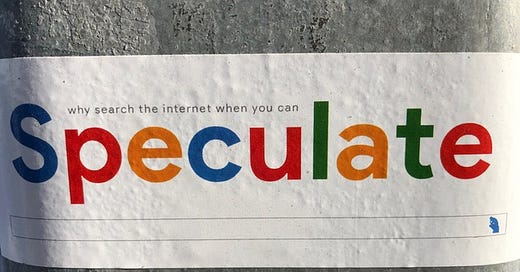As For Me, I Have Stopped to Watch
On the writer Raymond Carver, the musician Prince, stealthily applied stickers and poetry out the sunroof of a car
Truth & Dare is a monthly post that offers one Truth (a writing prompt) and one Dare (an artistic gesture in the world). You might also find: thoughts on writing, art, books and paying attention. You won’t find: a paywall or a thicket of hyperlinks taking you someplace else. Just a clean read, a cup of herbal tea poured over your frontal lobe. No noise. No distraction. Thank you for being here.
Before we get into this month’s post, a brief announcement: I’ve been invited to be on the faculty of The Attic’s Atheneum1 this fall. An annual certificate program, this is Portland’s alternative to a traditional or low-res MFA program. It melds independent study under close faculty supervision, student receptions, public readings, and other special Atheneum events created around good food and great conversation, dialogue, and literary community. Last week I went to the final student reading from this year’s cohort and was blown away by what a warm, supportive (and stellar writing) scene it was. Interested in learning more? Check out the website in the footnotes. Deadline to apply is July 7th. Feel free to get in touch if you have any questions.
Last month I got to be part of the Raymond Carver Writing Festival in Clatskanie (clát/skan/ī), ancestral land of the Tlatskanai tribe, and the place where the Clatskanie River flows through the town and empties into the Columbia River. I ran a table with the one and only Ben Parzybok, displaying our respective creative projects2 and we had many good conversations with people who stopped by. Former Oregon Poet Laureate Kim Stafford gave the keynote address — I was lucky to teach with him at Lewis & Clark College before he retired, and since that guy is a walking embodiment of wonder, that may be what got me thinking about the whole idea of wondering about things vs. knowing them. Later at a bar, I fell into conversation with a bookseller named Craig3 about the musician Prince (whose music may or may not have been playing in the background) and we discovered we had differing recollections as to the details of his untimely passing. I said I thought he’d lost consciousness on his private jet which required an emergency landing and Craig said for sure he collapsed in an elevator. It was a funny, friendly debate and we moved on to other topics, but later I found myself realizing I was okay with the not knowing. In fact, the longer I went not knowing, the more important it felt to never know.
It reminds me of a sticker I spotted last year, affixed to a light pole. I biked closer to see that it read: “Why search the internet when you can Speculate?”
In that moment, I felt a surge of the mystery (who stuck this here?) followed by joy (some kindred spirit out there is preoccupied about the same thing as me, only they took it to the next level, made a sticker and stealthily affixed them to poles around the city). Anyway, it struck me. And I find myself thinking that of all the ailments that plague humankind right now, one important sickness has to be the dearth of wonder. Tom Waits said it best: “We have a deficit of wonder. When I ask people questions now, they get out their phone. I say NOOOOO. I don’t want to know the answer. I just want to wonder about it for a while.”
I wonder if the Swainson’s Thrush outside my window is there every early morning at five, but I’ve only been conscious to hear it once, because the cat woke me. I wonder where Virgil the Squirrel went to, and worry that he grew so tame taking peanuts from my hand that he might have encountered a hand somewhere that was less generous. I wonder who the new crow is at the Peanut Board, the one who lingers at the board to pound the hell out of the peanuts with her beak, eating them right then and there, or sometimes soaking them in water for a minute first before taking them elsewhere to enjoy. She definitely subscribes to the Thoreau School of Suck the Marrow Out of Life.
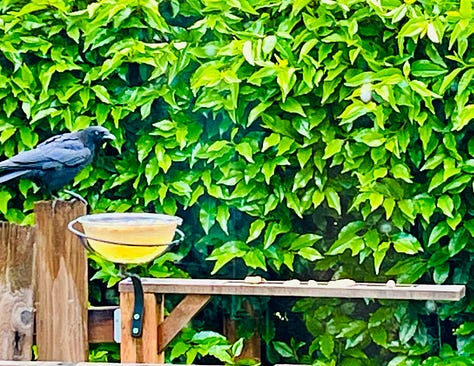

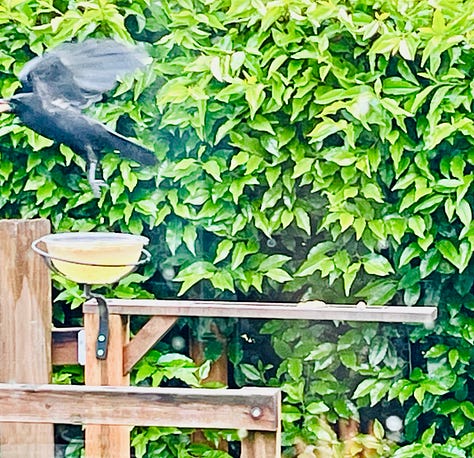
Raymond Carver was born in Clatskanie, but left as a young child and never returned except once, when he and his partner, the poet Tess Gallager, drove through and stopped in town. By then he had kicked the booze, and was an acclaimed short story writer. The story goes that they parked in the Safeway parking lot and read their poetry through the sun roof of their Mercedes Benz. For the festival, we recreated the scene, setting up a canopy in the same parking lot, spreading out copies of Carver’s poems on a table and inviting passersby to come choose a favorite and read it aloud. Over the course of the weekend, I heard that Carver and Tess Gallager had definitely read poetry out the top of a car sunroof and also that it may not have happened at all. But it didn’t matter to us. Brian parked his Subaru close and cranked open the sunroof. People perused the poems and chose one, then good-naturedly clambered into the station wagon, stood up through the roof and blinked in the cloud-covered sunshine at us gathered below, and read their poem aloud.
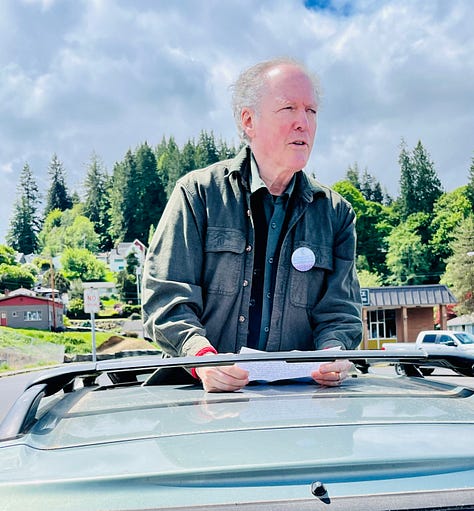
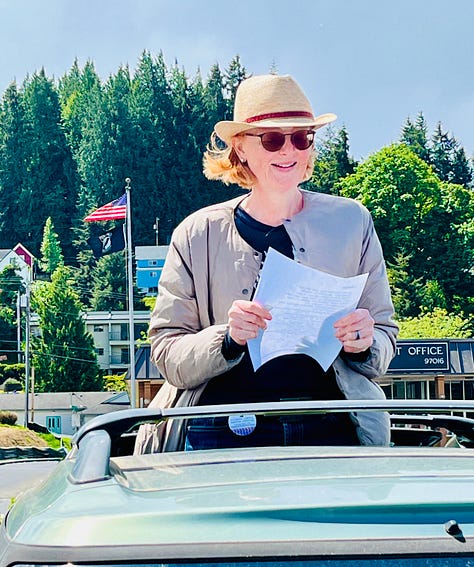
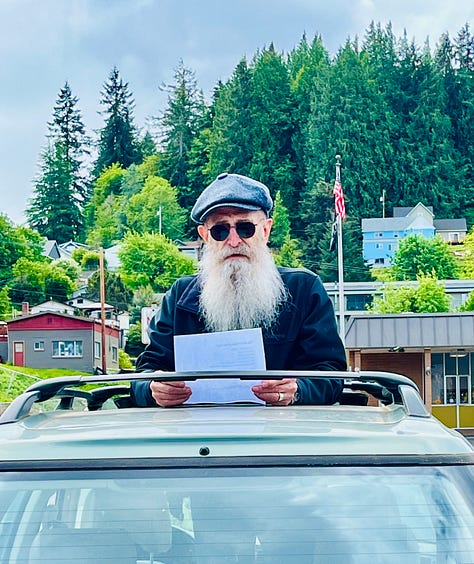
The poet Joseph Green (pictured above right, rocking his beret) has a dynamite crow poem that is a fitting end to this post (and ties into the Truth part of your Truth & Dare challenge this month):
The Business of Crows
One of them has a discarded
half-pint milk carton
by its pinched top
and is banging it on the sidewalk.
Hopping with it, dragging it along,
he hefts it with his beak
and swings it against the concrete.
Then he pauses to inspect his work,
to adjust his grip before
picking up the carton
and smacking it down again.
Every time he hits the sidewalk
with the empty box
it makes a flat, satisfying plop.
Perhaps that’s all the crow wants,
the hollow report
he gets for his labor
confirming its emptiness.
As for me, I have stopped
on the way back to my office
to watch a crow’s involvement
with a milk carton. Sunlight,
filtering through bare trees,
stains the bird a dark blue
that slips to black
like secret ink and makes sense
only as his feathers move.
What could possibly be
more important than this?
I have no further excuses.
“The Business of Crows” by Joseph Green from What Water Does at a Time Like This. © Moon Path Press, 2015.
TRUTH: Write a The Business of ________ poem in the style of Joseph Green’s “The Business of Crows,” by choosing a person, creature, plant or phenomena to observe. Study your subject for a while, then write down what you notice. Words, fragments of sentences, however it comes. Skim back through your notes and pull out the words and phrasing that feels potent to you, then assemble these into the order of your choosing. Share in the comments!
DARE: Buy a bag of unsalted peanuts and keep a stash handy. Give a peanut to the next crow you see in the world, and track what it does next. Bonus points if you sketch or paint the scene that unfolds.
Good luck and thank you (beyond measure) for reading this far. Seriously, you win the prize.
(my book Loaners: The Making of a Street Library, a Gumball Poetry machine, Ben’s novels)
